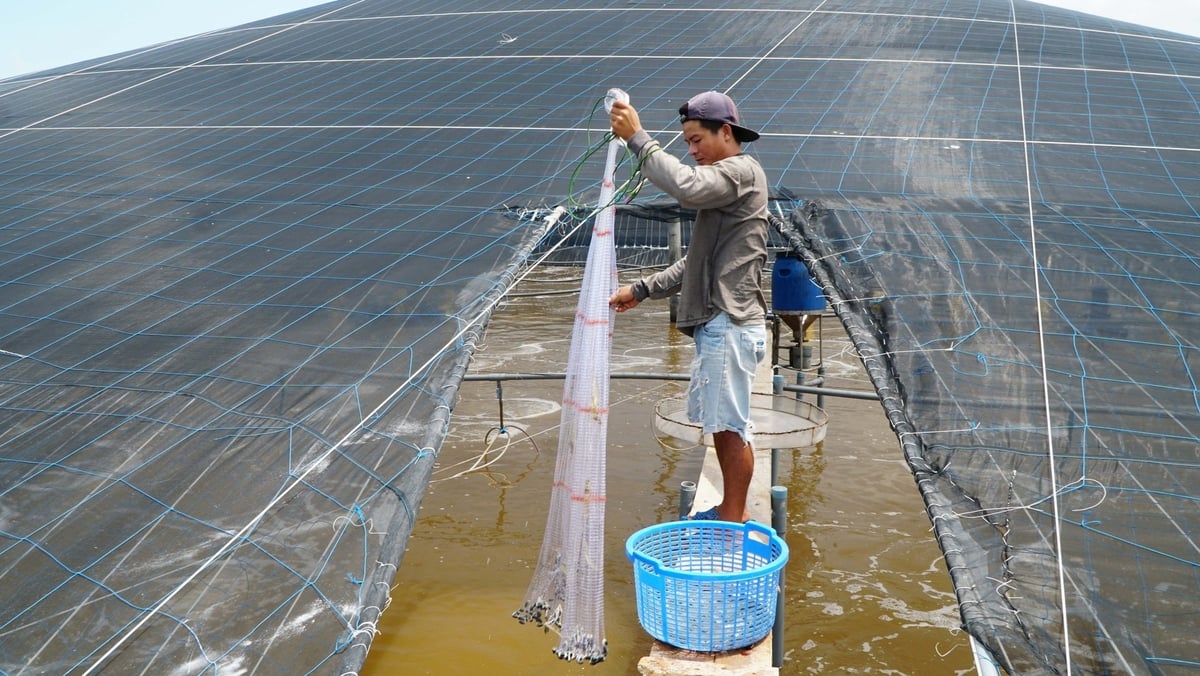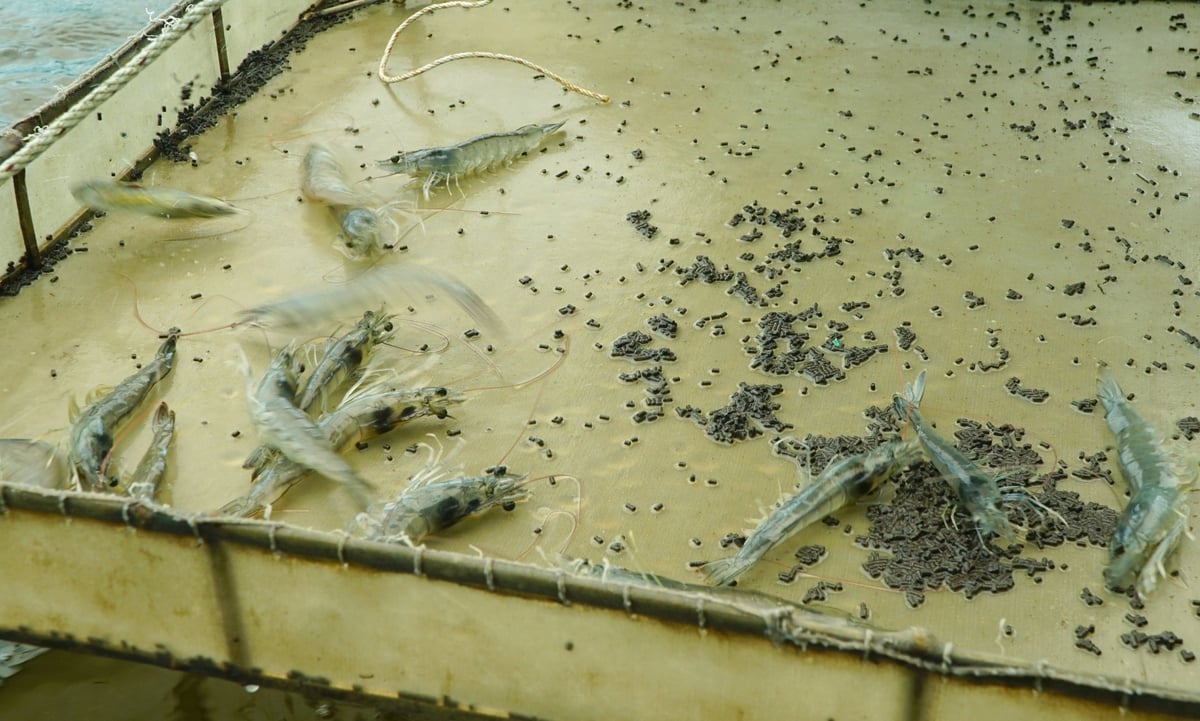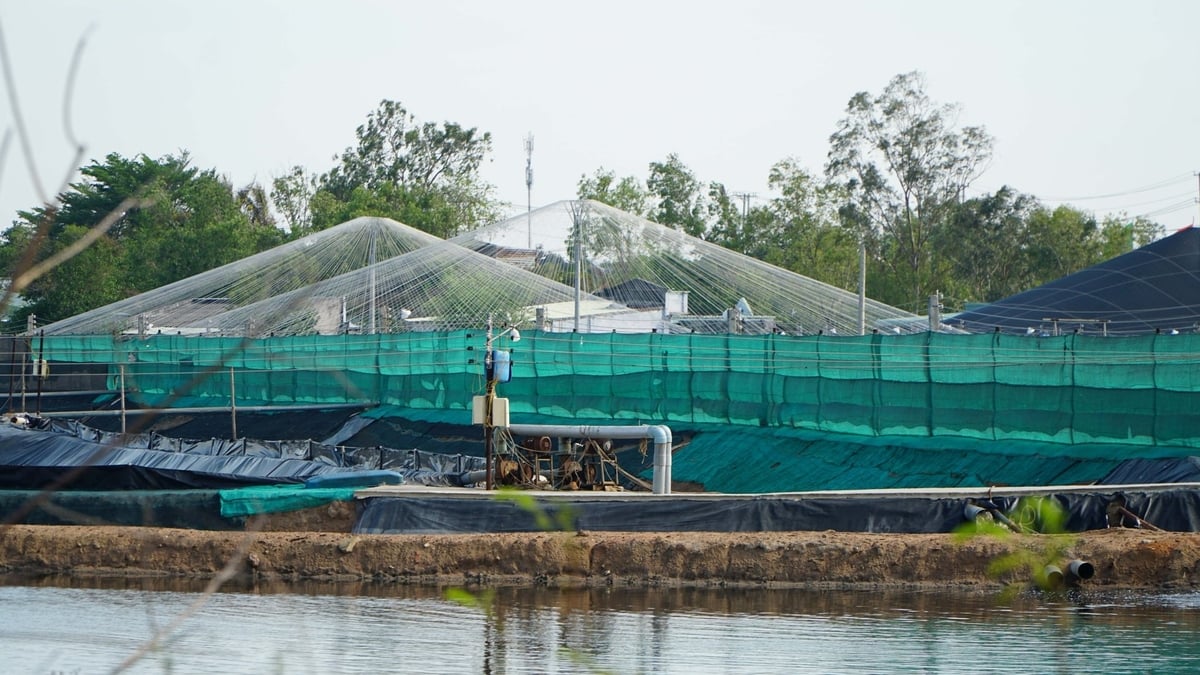December 1, 2025 | 15:14 GMT +7
December 1, 2025 | 15:14 GMT +7
Hotline: 0913.378.918
December 1, 2025 | 15:14 GMT +7
Hotline: 0913.378.918
According to aquaculture households in the suburbs of Ho Chi Minh city, the weather in 2025 is harsher than last year. Unstable temperatures, hot sun in the morning, and heavy rain in the afternoon have seriously affected the health of aquatic species such as shrimp and fish. Their resistance is reduced so they are more susceptible to disease. This slows down their growth process, and thus reducing economic efficiency.

Extreme weather conditions have caused many losses to shrimp farmers in the Ba Ria - Vung Tau area, even cooperatives with many years of experience are struggling. Photo: Le Binh.
Statistics from the Department of Fisheries and Fisheries Surveillance Region III (Ho Chi Minh city) show that in the first six months of 2025, the total aquaculture area reached 5,658.3 ha, including freshwater farming (1,847.4 ha), brackish water farming (358.5 ha) and farming on rivers and seas (573.5 ha). Among the farmed products, black tiger prawn accounts for 2,483.8 ha and white-leg shrimp occupies 395 ha. Farmers in the area also raise many other species such as grass carp, common carp, tilapia, lobster, and oysters.
Extreme weather results in many outbreaks of disease in aquatic products around Ho Chi Minh city. Five outbreaks of acute hepatopancreatic necrosis disease (AHPND) in farmed whiteleg shrimp were recorded in Ho Tram commune (formerly Phuoc Thuan commune, Xuyen Moc district, Ba Ria - Vung Tau province). As for Phuoc Thang ward (formerly ward 12, Vung Tau city), there have been eight shrimp samples infected with Enterocytozoon hepatopenaei (EHP) disease.
Even large, experienced farms such as Nguyen Van Cuong’s Manh Cuong 1 and Manh Cuong 2 (Long Dien commune) suffered heavy losses. He lost all of the one million shrimp fry released in April 2025, which was worth billions of VND.
“Unstable weather condition causes aquatic products to eat less or stop eating completely. They become weakened and susceptible to disease. In order to minimize risks, one of the most important factors is proactive prevention.
“Farmers should not overuse antibiotics, especially during the change of seasons. Instead, they should pay attention to minerals and vitamins to increase the resistance of fish and shrimp. Overuse of antibiotics can lead to drug resistance, thus reducing the effectiveness of treatment when livestock actually get sick,” said Doan Van Nam, Head of the Aquaculture Office, Department of Fisheries and Fisheries Surveillance Region III.
Huynh Van Them, Deputy Head of the Department of Livestock and Crop Production of Ba Ria - Vung Tau (under Ho Chi Minh City Department of Agriculture and Environment), said, “As per the results of environmental monitoring, warning and supervision in aquaculture areas, water quality in aquaculture areas shows signs of decline, with parameters such as pH, alkalinity, NH4-N, NO2-N, and COD exceeding the allowable threshold. These fluctuations, combined with erratic weather, increase the risk of dangerous disease outbreaks.”

Recent monitoring reports warn about unusual weather conditions causing water quality in farming areas to decline, making shrimp susceptible to disease. Photo: Le Binh.
Ho Chi Minh City Department of Agriculture and Environment has implemented many response solutions in the face of the dire situation. Livestock, crop production stations, and agricultural extension centers of communes and wards are required to regularly inspect and monitor aquaculture areas in the assigned area. Local authorities take the initiative to perform epidemiological investigations and monitor disease developments. The ultimate goal is to direct and timely act when detecting dead aquatic animals or those with unusual signs.
The Department also advises farmers to choose shrimp seeds with clear origins, carry out shrimp seed nursery thoroughly before starting the commercial model, and only release the seeds at a reasonable density when the water temperature is below 30 oC, depending on the farming method.

Aquaculture businesses, cooperatives and farmers are advised to increase investment in technology to ensure animal health in the context of increasingly unpredictable weather. Photo: Le Binh.
Farmers should proactively harvest shrimp when they reach commercial size or thin out the density immediately after detecting water shortages, droughts and saltwater intrusion occur. At the same time, Deputy Head Huynh Van Them also encourages businesses and farms to invest in modern technology in aquaculture to increase production efficiency.
Many aquaculture enterprises in Ho Chi Minh city have boldly applied high technology to production. Some notable examples include Minh Phu Loc An Aquaculture Company Limited, Phuoc Hai Seafood Joint Stock Company, Manh Cuong Aquaculture Company Limited, Quyet Thang Agricultural Cooperative, Lien Giang Farm, Thai Ha Farm, and Advanced Aquaculture Vietnam Company Limited.
Tarpaulin-lined ponds, floating ponds with tarpaulin-lined steel frames and roofs, or farming in membrane houses have become popular farming models. With super-intensive shrimp farming technology, the density can reach 250 - 500 shrimp/m², equivalent to an output of 30 - 50 tons/ha/crop.
Translated by Samuel Pham

(VAN) The Institute of Agricultural Sciences for Southern Vietnam (IAS) marked its 100th anniversary in Ho Chi Minh City, celebrating a century of growth as a leading institute contributing significantly to Viet Nam’s agricultural development.

(VAN) An increasing number of livestock farms are using biogas generators to create a source of renewable electricity, helping to save costs and mitigate environmental pollution.

(VAN) Small changes in rice cultivation, from irrigation methods and straw collection to input management, are paving a new way for Vietnam's agriculture in the journey toward emission reduction.

(VAN) With the project of converting biogas into renewable electricity, Australia is both helping pig farms reduce their energy costs by up to 25% and contributing to environmental protection.
![Hue aims for Net Zero: [1] Initial steps from green transportation](https://t.ex-cdn.com/nongnghiepmoitruong.vn/608w/files/huytd/2025/11/28/0853-anh-6-giao-thong-xanh-hue-094717_940-153724.jpg)
(VAN) For sustainable development, Hue City is implementing many solutions to promote green transportation, which is an important initial step on the journey to building a Net Zero Hue.

(VAN) Nghe An Province, one of the localities with the largest forest area in Vietnam, is set to gain significant benefits from the implementation of forest carbon credit payments.

(VAN) Circular agriculture helps Mekong Delta farmers cut greenhouse gas emissions while boosting incomes through efficient reuse of agricultural by-products.